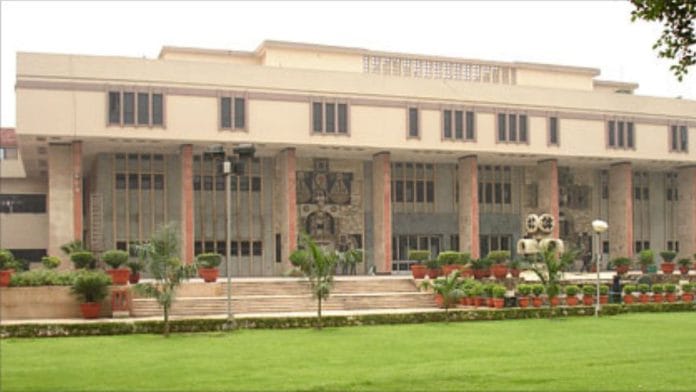New Delhi: The Delhi High Court rejected the bail plea of Aditya Krishna, accused of being a member of a racket selling counterfeit cancer drugs, observing that bail granted in a predicate offence does not automatically guarantee relief in a money laundering case.
On Tuesday, Justice Chandra Dhari Singh observed that money laundering is different from any predicate offence in terms of its nature, scope and purpose. It covers the entire process right from the origin of illegal money to its integration into the financial system. A predicate offence is a crime that is a component of a more serious crime.
The judge disposed of the bail application of Krishna, a graduate of IIT-BHU accused of selling fake cancer drugs through his chemist shop in Bihar’s Muzaffarpur district.
The Enforcement Directorate (ED) took Krishna into custody from Tihar Jail in April last year where he had been held under judicial custody since his arrest by Delhi Police on 13 March of that year.
The ED’s money laundering case stems from an FIR filed by Delhi Police’s Crime Branch alleging that a racket run primarily by Viphil Jain and Suraj Shat was selling counterfeit versions of cancer drugs Keytruda and Opdyta to cancer patients.
The agency alleged that Krishna, through his chemist shop in Muzaffarpur, was involved in laundering proceeds from the sales, which amounted to between Rs 1.05 lakh and Rs 1.10 lakh per transaction. The spurious drugs were openly sold on e-commerce sites such as IndiaMART without invoices.
Krishna’s counsel argued that since the same court had already granted him bail in the case filed by Delhi Police, which formed the basis of the money laundering probe, he was entitled to the same relief in the ED case.
The Delhi High Court on 29 July last year granted Krishna bail in the police case on the condition that he would not not engage in the business of supplying medicines until the completion of the trial.
However, Justice Singh dismissed the argument, saying that cases probed under provisions of the Prevention of Money Laundering Act (PMLA), Indian Penal Code (IPC) or other criminal laws are distinct. Hence, bail in the predicate offence holds no weight in the PMLA proceedings.
“It is well-settled that proceedings under the PMLA and the predicate offence registered under the IPC or other statutes are distinct in nature, scope, and purpose. The offence of money laundering under Section 3 of the PMLA is an independent offence that focuses on the process of disguising the illicit origin of funds and their integration into the financial system,” Justice Singh noted in the order.
“The grant of bail in the predicate offence, therefore, does not automatically entitle the applicant to bail under PMLA proceedings.”
Also Read: How Pooja Singhal, Jharkhand IAS officer under ED probe, held top posts despite past charges
Burden of proof in PMLA cases shifts onto the accused
Singh highlighted a crucial distinction between the IPC and the PMLA in his ruling.
Unlike general offences under the IPC, the PMLA imposes two stringent conditions under Section 45, which require the applicant must demonstrate he is not guilty of money laundering and that he is unlikely to commit any offence while on bail.
“The distinction is further reinforced by the fact that the burden of proof under Section 24 of the PMLA shifts onto the accused, which is a significant departure from the principles applicable in predicate offences under the CrPC,” Singh observed.
“Therefore, the mere fact that the applicant was granted bail in the predicate offence does not, ipso facto (by that very fact), justify the grant of bail in the present proceedings under PMLA,” he ruled.
The court commended the ED’s investigation, saying the probe agency’s case wasn’t just based on statements from co-accused individuals. Investigators also relied on documentary and technical evidence such as financial records, WhatsApp communications and transactional data to establish Krishna’s active involvement in the spurious drug racket.
The court noted that Krishna had deposited over Rs 51.34 lakh in his accounts during the period of the alleged offence. Justice Singh observed that these deposits – along with transfers to co-accused individuals, who have admitted to money laundering in their disclosures – primarily established a case of money laundering.
“Therefore, it is observed by this Court that the respondent had sufficient material in its possession, including financial records, digital evidence, and the applicant’s communications, to establish a valid ‘reason to believe’ that the applicant is guilty of the offence of money laundering,” Justice Singh further observed.
“The procedural safeguards under the PMLA were duly followed, and the challenge to the legality of the arrest is without merit. Furthermore, the contention that the applicant’s arrest was solely based on the statement of co-accused persons under Section 50 of the PMLA is unfounded and rejected.”
Justice Singh also rejected Krishna’s argument that since the alleged amount of money laundered was less than Rs 1 crore, he was eligible for an exception from stringent twin conditions for bail under Section 45 of the PMLA.
The judge clarified that the scope of money laundering, in this case, extends far beyond the Rs 1 crore threshold and emphasised that Krishna’s role must be assessed in the broader context of the criminal conspiracy in which he actively participated.
“In light of the above discussions on facts and law, it is held that the applicant has been unable to put forth any propositions before this Court that are sufficient for grant of bail and thus, the same are rejected,” Justice Singh ruled.
“In view of the same, this Court is not inclined to release the applicant on bail, and the instant application is, hereby, dismissed along with the pending applications, if any,”
Justice Singh also dismissed the bail applications of three other accused in this case—Lovee Narula, Rajesh Kumar, and Akshay Kumar.
(Edited by Sugita Katyal)
Also Read: Blowing up police stations to murders of MLAs, the life of slain Maoist commander Chalapathi






